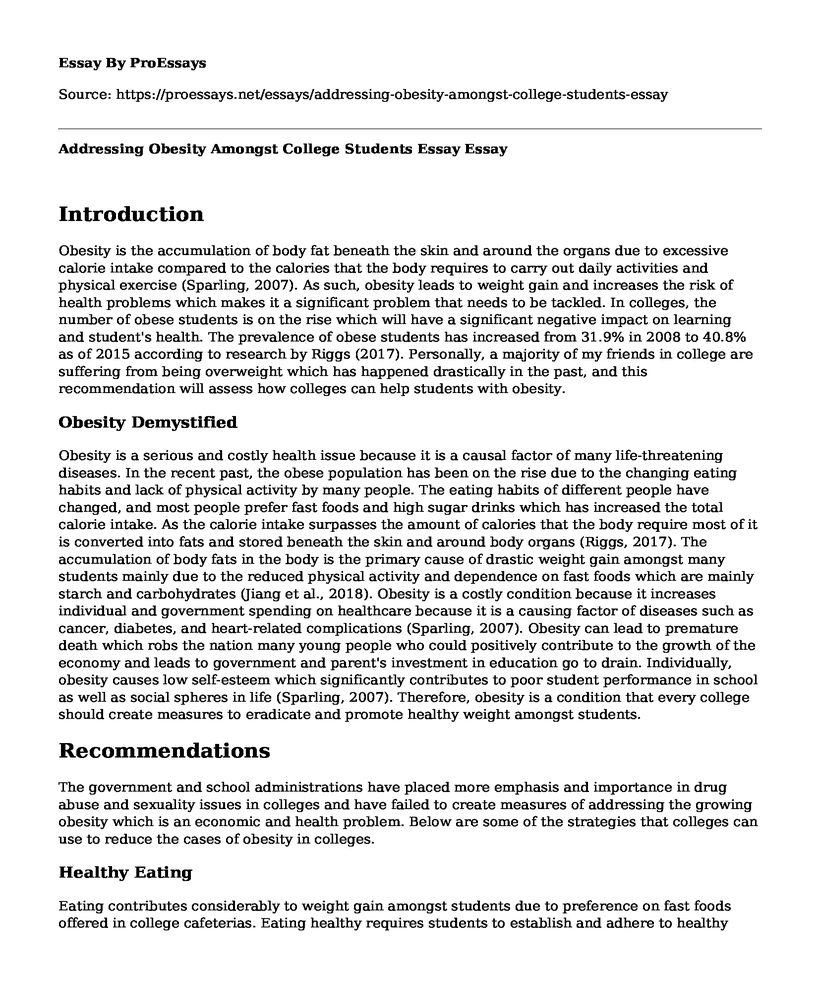Introduction
Obesity is the accumulation of body fat beneath the skin and around the organs due to excessive calorie intake compared to the calories that the body requires to carry out daily activities and physical exercise (Sparling, 2007). As such, obesity leads to weight gain and increases the risk of health problems which makes it a significant problem that needs to be tackled. In colleges, the number of obese students is on the rise which will have a significant negative impact on learning and student's health. The prevalence of obese students has increased from 31.9% in 2008 to 40.8% as of 2015 according to research by Riggs (2017). Personally, a majority of my friends in college are suffering from being overweight which has happened drastically in the past, and this recommendation will assess how colleges can help students with obesity.
Obesity Demystified
Obesity is a serious and costly health issue because it is a causal factor of many life-threatening diseases. In the recent past, the obese population has been on the rise due to the changing eating habits and lack of physical activity by many people. The eating habits of different people have changed, and most people prefer fast foods and high sugar drinks which has increased the total calorie intake. As the calorie intake surpasses the amount of calories that the body require most of it is converted into fats and stored beneath the skin and around body organs (Riggs, 2017). The accumulation of body fats in the body is the primary cause of drastic weight gain amongst many students mainly due to the reduced physical activity and dependence on fast foods which are mainly starch and carbohydrates (Jiang et al., 2018). Obesity is a costly condition because it increases individual and government spending on healthcare because it is a causing factor of diseases such as cancer, diabetes, and heart-related complications (Sparling, 2007). Obesity can lead to premature death which robs the nation many young people who could positively contribute to the growth of the economy and leads to government and parent's investment in education go to drain. Individually, obesity causes low self-esteem which significantly contributes to poor student performance in school as well as social spheres in life (Sparling, 2007). Therefore, obesity is a condition that every college should create measures to eradicate and promote healthy weight amongst students.
Recommendations
The government and school administrations have placed more emphasis and importance in drug abuse and sexuality issues in colleges and have failed to create measures of addressing the growing obesity which is an economic and health problem. Below are some of the strategies that colleges can use to reduce the cases of obesity in colleges.
Healthy Eating
Eating contributes considerably to weight gain amongst students due to preference on fast foods offered in college cafeterias. Eating healthy requires students to establish and adhere to healthy eating habits by ensuring a balanced diet and eating based on one's physical activities (Sparling, 2007). Colleges should sensitize students by creating eating habits classes to educate students on the essence of a healthy diet.
Regular Physical Exercise and Healthy Social Relationships
Lack of physical exercises, stress, and depression have also been blamed for the high number of obese students in colleges (Riggs, 2017). Students should be encouraged to participate in physical activities such as regular exercising and joining sports clubs to lead an active life which ensures that the body can use all the calories consumed (Sparling, 2007). Healthy relationships and psychological counseling in colleges will also encourage students to share with their peers their problems which can help reduce stress which increases the chances of becoming obese.
Conclusion
I believe that obesity is a significant problem that affects students' academic performance as well as social well-being in colleges. Colleges and the department of education should act swiftly to manage and control the rising obesity cases in colleges. Urgent intervention through healthy diets education and encouraging students to engage in physical activities can bring obesity levels in colleges under control.
References
Jiang, S., Peng, S., Yang, T., Cottrell, R. R., & Li, L. (2018). Overweight and obesity among Chinese college students: An exploration of gender as related to external environmental influences. American journal of men's health, 1557988317750990.
Riggs, A. (2017). Perceptions about Overweight and Obesity Among College Students: Application of the Health Belief Model (Doctoral dissertation, Appalachian State University).
Sparling, P. B. (2007). Obesity on campus. Preventing chronic disease, 4(3).
Cite this page
Addressing Obesity Amongst College Students Essay. (2022, Jul 08). Retrieved from https://proessays.net/essays/addressing-obesity-amongst-college-students-essay
If you are the original author of this essay and no longer wish to have it published on the ProEssays website, please click below to request its removal:
- Personal Essay Example - An Aspect of College I Found Disappointing
- Assignment Example on Alzheimer's Disease
- Reflection on How the Health Care Course Has Played a Role in Goal Achievement
- Anatomy and Physiology: Speech Language Pathology Paper Example
- Essay Example on Abortion Debate: Right or Wrong?
- Paper Example on Gifted and Talented Parenting: A Personal Journey
- Essay Example on Northwell Health: Leaders Advancing Excellence & Compassion







